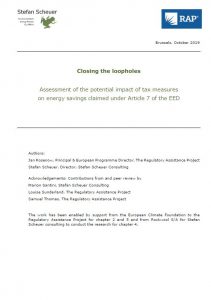A
first check of Ursula von der Leyen’s agenda against the Coalition for
Energy Savings’ recommendations for a fast, fair and attractive
transition.
By Stefan Scheuer, Secretary General of the Coalition for Energy Savings
Commission President-elect Ursula von der Leyen wants a new working style: she announces a more inclusive and open approach and intends to give the Parliament the right to initiate legislation. Next to gender balance, she made climate protection her central campaign element and committed to bold pledges in an effort to secure her election. Within her fist 100 days in office she promises to propose a European Green Deal including a law to enshrine 2050 climate neutrality. Climate has never been as high on the Commission agenda. This provides an important opportunity for energy efficiency policies.
Von der
Leyen also pledges to increase the 2030 targets for greenhouse gas
emissions reduction to 50%. As it stands, energy efficiency and
renewables targets only get us to at least 46% in 2030. An increased
ambition for GHG emissions reduction means to raise the current minimum
32.5% energy efficiency target towards the cost-effective potential,
which stands at 40%.
But how will the new Commission
President-elect deliver action on the ground in light of the 2020 energy
efficiency target gap and the far too slow progress on energy
efficiency?
First of all, von der Leyen’s agenda includes a
promise to use the EU’s budget to support the rule of law. This could
provide a key tool to ensure the proper implementation and enforcement
of existing EU energy and climate laws.
Further, she plans to
step up pricing signals, as she believes that “carbon emissions must
have a price. Every person and every sector will have to contribute”.
Concretely, she suggests to extend the EU-ETS to the maritime sector but
also to ‘traffic’ and ‘construction’ and to introduce a carbon border
tax to prevent carbon leakage. While price signals do help improve
energy efficiency, they are on their own insufficient when the main
market failures are non-economic, like in the case of building
renovations. Complementary measures are needed like financial support
mechanisms, which could be funded through carbon revenues, and
efficiency regulations. Further, an ETS extension has been discussed
many times but was never found to be practicable or feasible. The
proposal might turn out to be a smokescreen or, as Juncker’s proposal
for qualified majority voting on CO2 taxes, not accepted by Member States who then will be blamed for the failure.
Important
for delivery on the ground will be her proposals for a Sustainable
Europe Investment Plan. They include to turn a part of the EIB into a
Climate Bank supporting one trillion euro investments by 2030. This has
to be put into the perspective of the 2.6 trillion Euro additional
investment needed to achieve the current 2030 targets, according to a
recent Commission’s modelling. Missing from her plan is an approach how
to avoid detrimental investments and how to use the MFF and Member
States’ public funding to attract private financing. These are key
questions in order to close the investment gaps in each sector and, in
particular, the gaps in NECPs and long-term renovation strategies.
In
addition, her industrial strategy lacks content. It should support
renovation solutions and earmark enough money for technical assistance
and for the origination of bottom-up projects, in line with von der
Leyen’s priority of a “new push for European democracy” (bringing the
Union closer to citizens).
Coalition for Energ Savings: EU priority actions 2019-2024 for a fast, fair and attractive transition
President-elect Ursula von der Leyen: Towards a new commission 2019-2024






